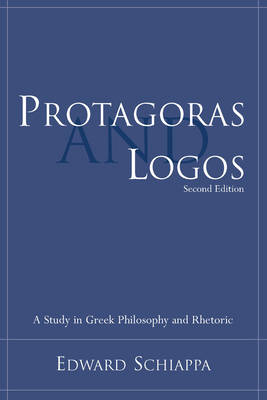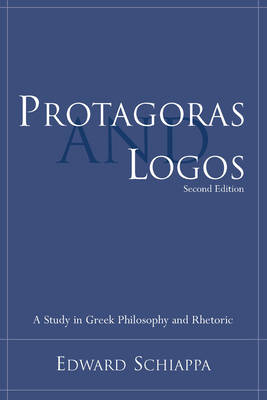
- Afhalen na 1 uur in een winkel met voorraad
- Gratis thuislevering in België vanaf € 30
- Ruim aanbod met 7 miljoen producten
- Afhalen na 1 uur in een winkel met voorraad
- Gratis thuislevering in België vanaf € 30
- Ruim aanbod met 7 miljoen producten
Omschrijving
Reassesses the philosophical and pedagogical contributions of Protagoras
Protagoras and Logos brings together in a meaningful synthesis the contributions and rhetoric of the first and most famous of the Older Sophists, Protagoras of Abdera. Most accounts of Protagoras rely on the somewhat hostile reports of Plato and Aristotle. By focusing on Protagoras's own surviving words, this study corrects many long-standing misinterpretations and presents significant facts: Protagoras was a first-rate philosophical thinker who positively influenced the theories of Plato and Aristotle, and Protagoras pioneered the study of language and was the first theorist of rhetoric. In addition to illustrating valuable methods of translating and reading fifth-century B.C.E. Greek passages, the book marshals evidence for the important philological conclusion that the Greek word translated as rhetoric was a coinage by Plato in the early fourth century.
In this second edition, Edward Schiappa reassesses the philosophical and pedagogical contributions of Protagoras. Schiappa argues that traditional accounts of Protagoras are hampered by mistaken assumptions about the Sophists and the teaching of the art of rhetoric in the fifth century. He shows that, contrary to tradition, the so-called Older Sophists investigated and taught the skills of logos, which is closer to modern conceptions of critical reasoning than of persuasive oratory. Schiappa also offers interpretations for each of Protagoras's major surviving fragments and examines Protagoras's contributions to the theory and practice of Greek education, politics, and philosophy. In a new afterword Schiappa addresses historiographical issues that have occupied scholars in rhetorical studies over the past ten years, and throughout the study he provides references to scholarship from the last decade that has refined his views on Protagoras and other Sophists.
Specificaties
Betrokkenen
- Auteur(s):
- Uitgeverij:
Inhoud
- Aantal bladzijden:
- 251
- Taal:
- Engels
- Reeks:
Eigenschappen
- Productcode (EAN):
- 9781570035210
- Verschijningsdatum:
- 31/10/2003
- Uitvoering:
- Paperback
- Formaat:
- Trade paperback (VS)
- Afmetingen:
- 154 mm x 234 mm
- Gewicht:
- 421 g

Alleen bij Standaard Boekhandel
Beoordelingen
We publiceren alleen reviews die voldoen aan de voorwaarden voor reviews. Bekijk onze voorwaarden voor reviews.








